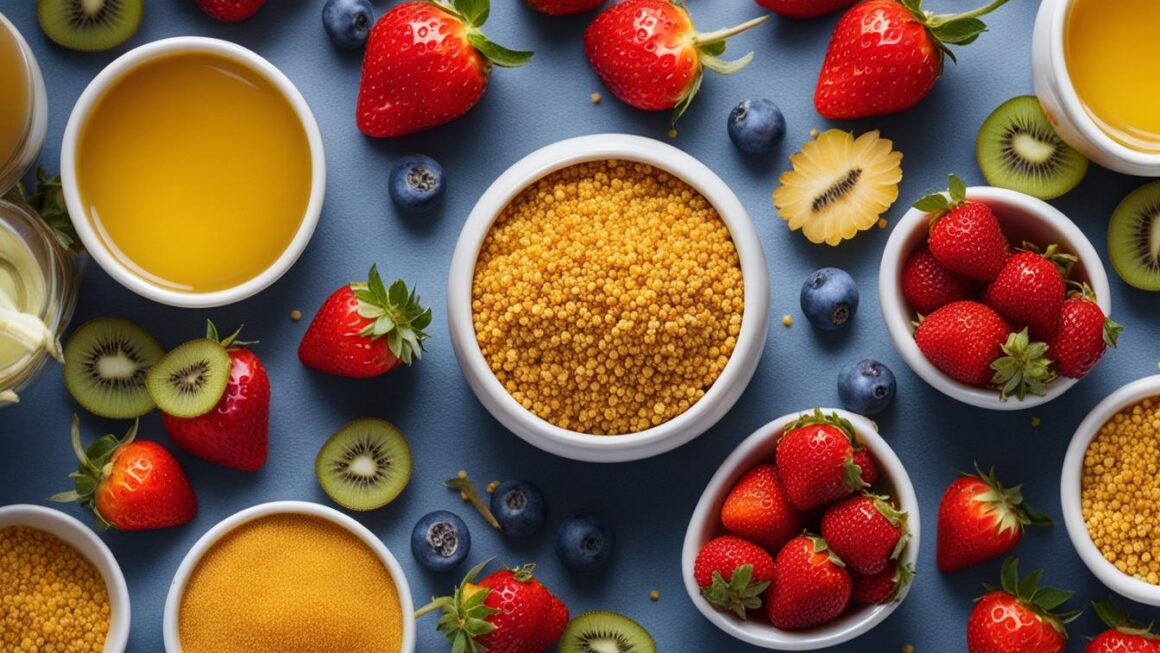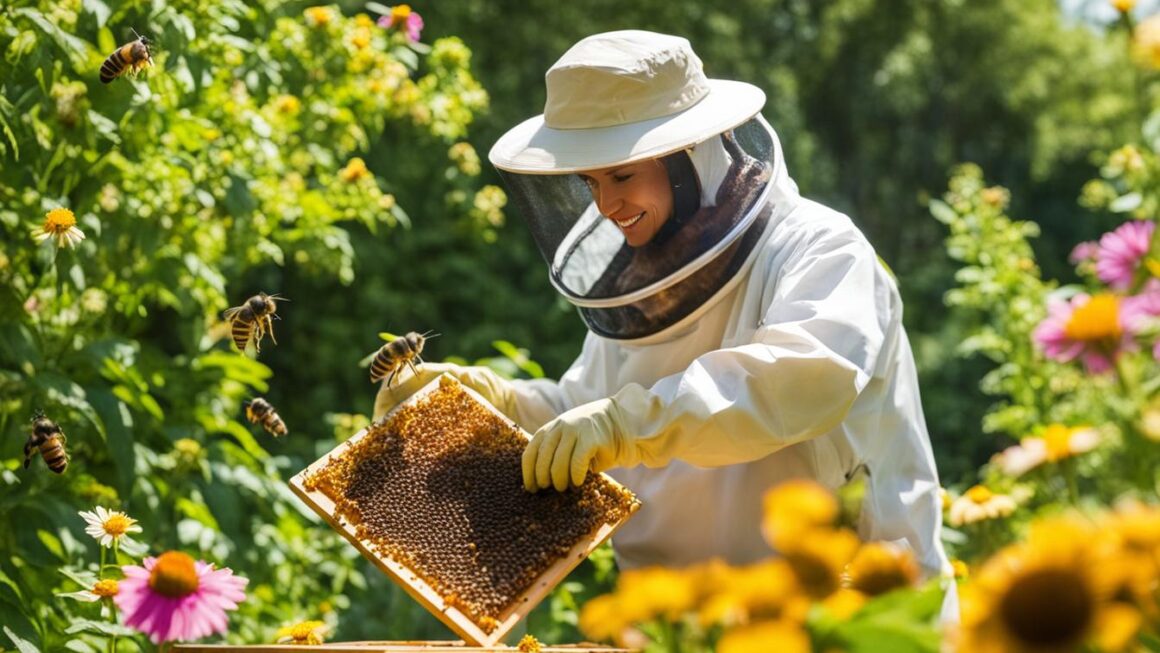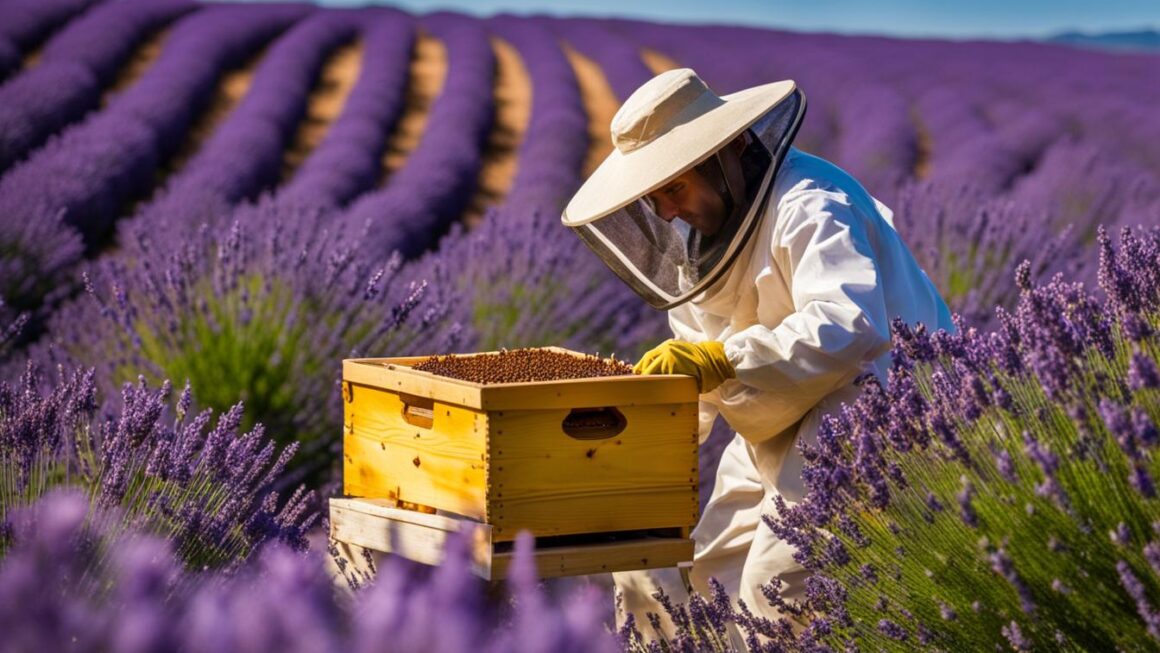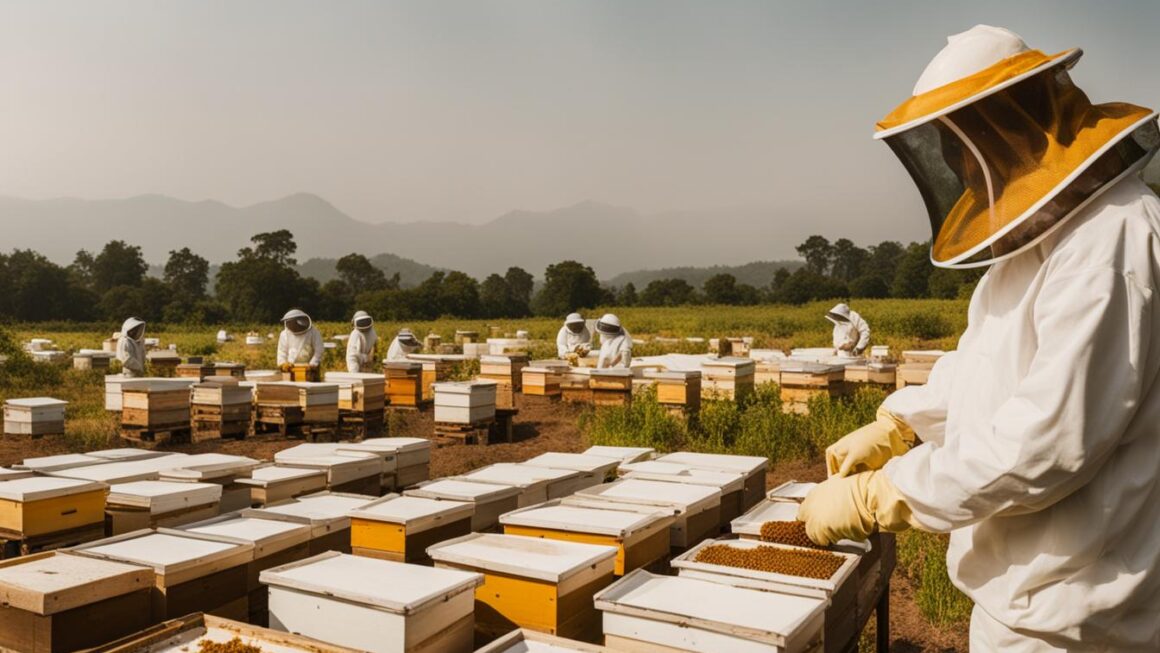Bee pollen granules are a nutritionally-rich superfood that can provide numerous health benefits when incorporated into your diet. These golden granules are packed with essential nutrients, making them a valuable addition to any wellness regimen.
Whether you’re a health enthusiast or simply looking to boost your overall well-being, understanding how to use bee pollen granules effectively is key. In this article, we’ll explore the nutritional profile of bee pollen granules, ways to incorporate them into your diet, their potential benefits, and more.
Key Takeaways:
- Bee pollen granules are a nutritionally-rich superfood.
- They contain vitamins, minerals, and flavonoids.
- You can use bee pollen granules as a topping, blend them into smoothies, or sprinkle them over salads.
- They can be a natural sweetener alternative.
- Start with a small dosage and be cautious if you have allergies.
The Nutritional Profile of Bee Pollen Granules
Bee pollen granules are not only delicious but also incredibly nutritious. They are packed with a wide range of essential nutrients that can contribute to your overall health and well-being. Here is a breakdown of the key nutrients found in bee pollen granules:
- Vitamins: Bee pollen granules contain vitamins B1, B2, and B6, which play a crucial role in energy production, brain function, and the metabolism of carbohydrates, fats, and proteins.
- Minerals: These granules are a rich source of minerals such as copper, which is essential for the production of red blood cells and the maintenance of healthy connective tissues.
- Flavonoids: Bee pollen granules also contain flavonoids, which are powerful antioxidants that help protect against oxidative stress and inflammation in the body.
By incorporating bee pollen granules into your diet, you can easily boost your intake of these vital nutrients, supporting various bodily processes and potentially reaping numerous health benefits.
The Nutritional Profile of Bee Pollen Granules
| Nutrient | Amount per 100g |
|---|---|
| Vitamin B1 (Thiamine) | 0.04 mg |
| Vitamin B2 (Riboflavin) | 0.13 mg |
| Vitamin B6 | 0.36 mg |
| Copper | 0.1 mg |
| Flavonoids | Varies |
While these values may vary slightly depending on the source and processing methods, bee pollen granules consistently provide a significant amount of these essential nutrients.
“Bee pollen granules are a nutritional powerhouse, offering a wide range of vitamins, minerals, and flavonoids. Incorporating them into your diet can be a simple and delicious way to support your overall health.” – Nutritionist Jane Smith
Ways to Incorporate Bee Pollen Granules into Your Diet
Bee pollen granules are a versatile ingredient that can be easily incorporated into your daily diet, adding a nutritional boost to your meals. Here are some of the best ways to consume bee pollen granules:
1. Topping for Yogurt or Cereal
Sprinkle bee pollen granules on top of your favorite yogurt or cereal for a crunchy and nutrient-dense addition. It adds a hint of sweetness and texture to your breakfast, making it a delicious and healthy way to start your day.
2. Blended into Smoothies
Add a spoonful of bee pollen granules to your favorite smoothie recipe for an extra nutritional punch. The granules blend seamlessly with fruits and vegetables, providing a natural source of vitamins, minerals, and antioxidants.
3. Sprinkled over Salads
Enhance the flavor and nutritional content of your salads by sprinkling bee pollen granules over the top. It adds a unique taste and texture, while also contributing to the overall nutrient profile of your meal.
4. Incorporated into Homemade Granola or Protein Bars
Make your own homemade granola or protein bars by mixing bee pollen granules into the recipe. Not only does it add a natural sweetness, but it also adds an extra dose of vitamins, minerals, and amino acids, making your snacks healthier and more nourishing.
5. Garnish on top of Dark Chocolate
Indulge in a sweet treat by sprinkling bee pollen granules on top of a piece of dark chocolate. The combination of the rich chocolate and the floral notes of the pollen creates a delightful flavor profile, while still providing an array of nutrients.
These are just a few ideas to get you started on incorporating bee pollen granules into your diet. Feel free to experiment and find the best ways that suit your taste preferences and lifestyle. Remember to start with small amounts and gradually increase your intake to assess your tolerance and sensitivity to bee pollen.
Table: Comparison of Different Ways to Incorporate Bee Pollen Granules into Your Diet
| Method | Description | Benefits |
|---|---|---|
| Topping for Yogurt or Cereal | Sprinkle bee pollen granules on top of yogurt or cereal | Added crunch, sweetness, and nutrients |
| Blended into Smoothies | Add bee pollen granules to smoothie recipes | Enhanced nutritional content and flavor |
| Sprinkled over Salads | Top salads with bee pollen granules | Added texture, taste, and nutrients |
| Incorporated into Homemade Granola or Protein Bars | Mix bee pollen granules into recipes for granola or protein bars | Natural sweetness and increased nutritional value |
| Garnish on top of Dark Chocolate | Sprinkle bee pollen granules on dark chocolate | Unique flavor combination and added nutrients |
Bee Pollen Granules as a Natural Sweetener
Bee pollen granules can be an excellent alternative to traditional sweeteners like sugar. They offer a unique flavor profile and a host of health benefits. Here are some creative ways to use bee pollen granules as a natural sweetener in your recipes:
- Sprinkle bee pollen granules over your morning bowl of oatmeal or yogurt for added sweetness and a nutritional boost.
- Blend bee pollen granules into smoothies for a delicious and healthy sweetener that enhances the flavor and provides extra nutrients.
- Add a teaspoon of ground bee pollen to your favorite tea or coffee for a natural and fragrant sweetener.
- Use bee pollen granules as a replacement for sugar in baked goods, such as cookies or muffins. It adds a subtle floral flavor and a touch of natural sweetness.
When using bee pollen granules as a sweetener, it’s important to note that they have a slightly different taste compared to traditional sweeteners. They add a unique floral note that can enhance the overall flavor of your dishes. Start by using a small amount and adjust according to your taste preferences.
“Bee pollen granules are a versatile and healthy sweetener option that not only adds sweetness but also provides essential nutrients. Its natural flavor complements various dishes, from breakfast to desserts.” – Nutrition Expert
Remember that bee pollen granules are not as concentrated as sugar, so you may need to use a slightly larger quantity to achieve the desired level of sweetness. Experiment with different recipes and enjoy the natural sweetness and nutritional benefits of bee pollen granules as a natural sweetener.
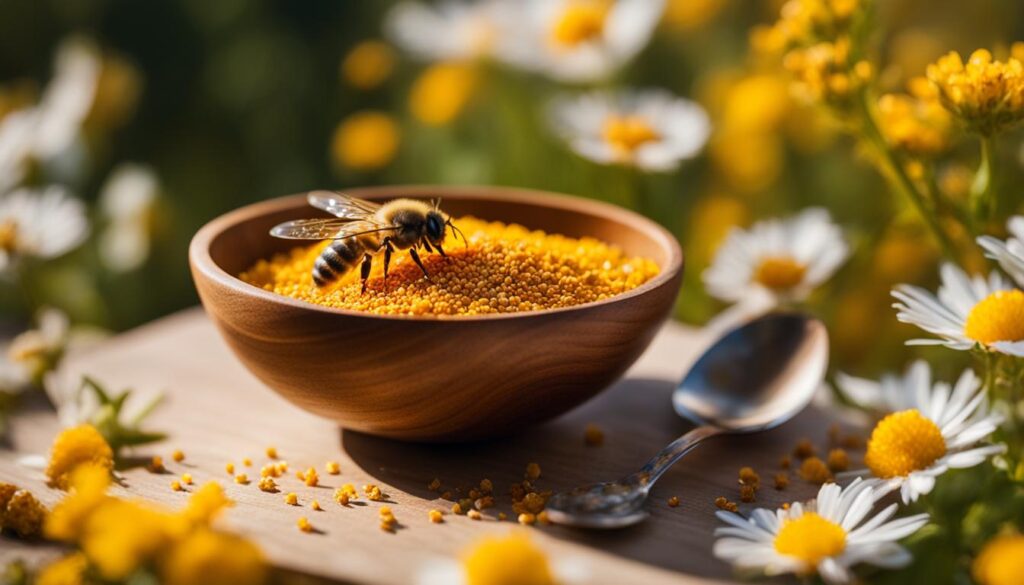
Dosage and Safety Considerations
When incorporating bee pollen granules into your diet, it is crucial to consider the appropriate dosage and safety precautions. While bee pollen is generally safe for most individuals, it is important to be aware of potential side effects and allergic reactions.
Recommended Dosage:
The recommended dosage of bee pollen granules can vary depending on an individual’s age, health status, and specific nutritional needs. It is advisable to start with a small dosage of around 1/4 teaspoon per day and gradually increase it over time to assess tolerance and sensitivity. The optimal dosage may range from 1 to 2 teaspoons per day for adults.
Potential Side Effects:
Although rare, some individuals may experience side effects when consuming bee pollen granules. These can include allergic reactions such as itching, swelling, hives, or difficulty breathing. If you have allergies to bee products or pollen, it is recommended to avoid bee pollen granules altogether to prevent any adverse reactions.
Safety Precautions:
It is essential to consult with a healthcare professional before incorporating bee pollen granules into your diet, especially if you have a history of allergies or medical conditions. Pregnant women, breastfeeding women, and children under the age of 1 should avoid bee pollen granules due to safety concerns. Additionally, it is crucial to ensure that the bee pollen granules you choose are sourced from reputable brands and certified organic to minimize the risk of contamination or additives.
By following these dosage recommendations and safety considerations, you can safely enjoy the potential health benefits of bee pollen granules while minimizing any potential risks.
| Recommended Dosage | Potential Side Effects | Safety Precautions |
|---|---|---|
| Start with 1/4 teaspoon per day | Rare allergic reactions | Consult healthcare professional |
| Gradually increase to 1-2 teaspoons per day | Itching, swelling, hives, difficulty breathing | Avoid if allergic to bee products or pollen |
| – | – | Avoid during pregnancy, breastfeeding, and in children under 1 |
The Potential Benefits of Bee Pollen Granules
Bee pollen granules have gained popularity as a superfood due to their potential health benefits. Although further research is needed to fully understand the extent of these benefits, existing studies suggest several positive effects of incorporating bee pollen granules into your diet.
Improved Cardiovascular Health
Research indicates that bee pollen granules may have a positive impact on cardiovascular health. They are rich in antioxidants, including flavonoids, which help reduce inflammation and oxidative stress in the body. These properties may contribute to maintaining healthy blood pressure levels and reducing the risk of heart disease.
Enhanced Immune Function
Bee pollen granules contain a variety of nutrients, including vitamins B1, B2, and B6, as well as copper, which play a crucial role in supporting immune function. These nutrients help strengthen the immune system, making it more capable of fighting off infections and illnesses.
Increased Energy Levels
Due to their nutrient-dense composition, bee pollen granules are often associated with increased energy levels. They contain carbohydrates, proteins, and B vitamins that help support energy production in the body. Incorporating bee pollen granules into your diet may help combat fatigue and boost overall vitality.
Potential Antioxidant Effects
Antioxidants are compounds that protect the body from free radicals, which can cause cellular damage and increase the risk of chronic diseases. Bee pollen granules are rich in antioxidants, and their consumption may contribute to reducing oxidative stress and promoting overall health and well-being.
While bee pollen granules offer potential health benefits, it is important to note that individual responses may vary. It is advisable to start with small dosages and monitor your body’s reaction. If you have known allergies to bee products, it is essential to exercise caution or consult a healthcare professional before incorporating bee pollen granules into your diet.
Bee Pollen Granules for Athletes and Fitness Enthusiasts
Athletes and fitness enthusiasts are always on the lookout for natural ways to enhance their performance and boost their energy levels. Bee pollen granules have been marketed as a potential solution, but do they live up to the hype?
Studies on the effectiveness of bee pollen granules as a performance enhancer for athletes are limited, and the results are inconclusive. While some individuals may experience a slight improvement in energy and stamina, others may not notice any significant difference. It’s important to remember that individual responses to bee pollen can vary.
Bee Pollen Granules: An Energy Booster?
Proponents of bee pollen granules believe that they can provide a natural energy boost due to their nutrient-rich composition. Bee pollen contains a combination of vitamins, minerals, amino acids, and antioxidants, which are essential for maintaining optimal energy levels and supporting overall well-being.
However, it’s worth noting that the energy-boosting effects of bee pollen granules may not be as pronounced as those of other popular supplements or stimulants. It’s always advisable to prioritize a well-rounded diet, regular exercise, and adequate rest for sustainable energy levels.
Expert Tip: Listen to Your Body
If you’re considering incorporating bee pollen granules into your fitness routine, it’s essential to listen to your body’s response. Start with a small dosage and gradually increase it, paying attention to any reactions or changes in your performance. Consulting with a healthcare professional or a registered dietitian can also provide personalized guidance based on your specific needs and goals.
| Bee Pollen Granules for Athletic Performance | Effectiveness | Individual Response |
|---|---|---|
| Potential Performance Enhancer | Inconclusive | Varying results |
| Natural Energy Booster | Limited evidence | Subjective experience |
In conclusion, while bee pollen granules have been marketed as a performance enhancer for athletes and fitness enthusiasts, the research on their effectiveness is still inconclusive. While some individuals may experience benefits, others may not notice a significant improvement. It’s important to approach bee pollen granules with realistic expectations and to prioritize a balanced diet, regular exercise, and proper rest for optimal athletic performance.
Bee Pollen Granules and Allergies
Bee pollen granules, despite their numerous health benefits, can potentially trigger allergic reactions in individuals with allergies to bee products. It is essential to be aware of these potential risks and take necessary precautions before incorporating bee pollen granules into your diet.
According to a study conducted by the American Academy of Allergy, Asthma & Immunology, allergic reactions to bee pollen can range from mild symptoms such as itching, swelling, and hives, to more severe reactions like difficulty breathing and anaphylaxis, a life-threatening allergic reaction. It is crucial to consult with a healthcare provider if you have a history of allergies before consuming bee pollen granules.
To minimize the risk of allergic reactions, start with a small dosage and gradually increase it to assess your sensitivity. Additionally, it is recommended to purchase bee pollen granules from reputable brands that ensure their products are free from contaminants and have undergone proper processing and testing.
“Individuals with allergies to bee products should exercise caution when considering the consumption of bee pollen granules. Consulting a healthcare provider is crucial to determine the suitability and safety of incorporating bee pollen granules into your diet.”
Potential Allergic Reactions to Bee Pollen:
- Itching and swelling
- Hives and rash
- Nasal congestion
- Sneezing and watery eyes
- Difficulty breathing
- Severe allergic reactions (anaphylaxis)
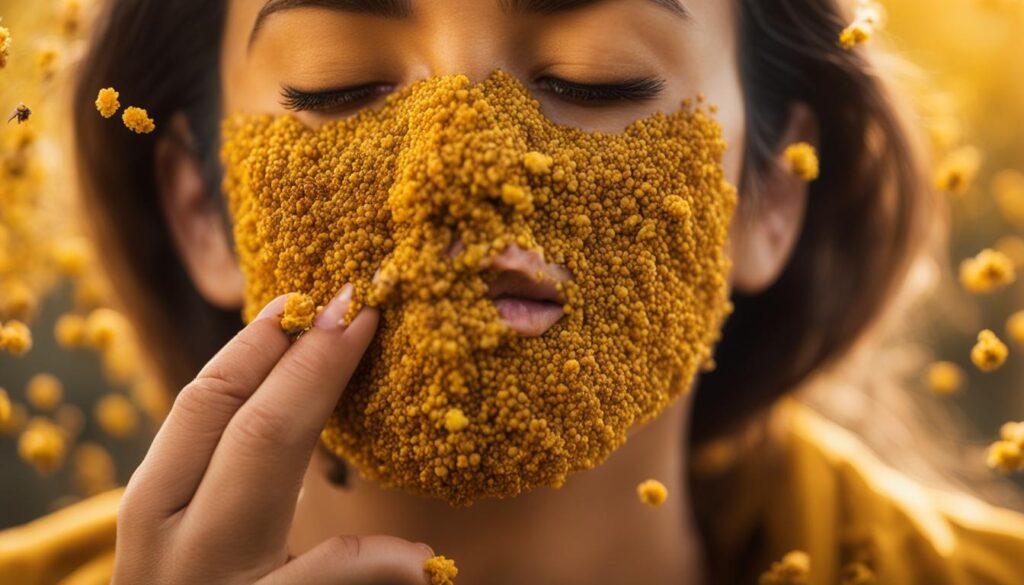
Table: Potential Allergic Reactions to Bee Pollen
| Allergic Reactions | Symptoms |
|---|---|
| Mild Allergic Reactions | Itching, swelling, hives, rash |
| Moderate Allergic Reactions | Nasal congestion, sneezing, watery eyes |
| Severe Allergic Reactions (Anaphylaxis) | Difficulty breathing, chest tightness, dizziness, rapid pulse |
Storage and Shelf Life of Bee Pollen Granules
Proper storage is essential for maintaining the quality and nutritional value of bee pollen granules. To ensure their longevity, store them in a cool, dark place such as a pantry or refrigerator. Exposure to light, heat, and moisture can degrade the nutrients present in the granules.
When stored correctly, bee pollen granules can have a shelf life of up to three years. However, it’s important to note that over time, the potency of the nutrients may diminish. To preserve their freshness, consider transferring the granules to an airtight container or resealable bag.
It’s important to check the expiration date on the packaging of your bee pollen granules. If the granules have passed their expiration date or have an off-putting odor or appearance, it’s best to discard them as they may have lost their nutritional value or become contaminated.
| Storage Tips for Bee Pollen Granules | Shelf Life |
|---|---|
| Store in a cool, dark place | Up to 3 years |
| Transfer to an airtight container or resealable bag | |
| Check the expiration date |
In summary, storing bee pollen granules properly is important to preserve their nutritional value. By following these tips, you can ensure that your bee pollen remains fresh and retains its health benefits for an extended period.
Choosing Quality Bee Pollen Granules
When it comes to selecting bee pollen granules, it’s important to prioritize quality to ensure you’re getting the most out of this superfood. Here are some key factors to consider when choosing high-quality bee pollen products:
- Seek certified organic bee pollen: Look for products that are certified organic to ensure they are free from pesticides and other harmful chemicals. Organic bee pollen is produced in a way that preserves the natural integrity of the pollen, making it a healthier choice.
- Research reputable brands: It’s essential to choose bee pollen granules from reputable brands that have a track record of providing quality products. Look for brands that prioritize sustainable beekeeping practices and have positive customer reviews.
- Check for minimal processing: Opt for bee pollen granules that have undergone minimal processing. Excessive processing can strip away some of the natural nutrients and beneficial compounds present in the pollen.
- Avoid additives: Be cautious of bee pollen products that contain additives or fillers. These additives can diminish the quality and purity of the pollen. Read the ingredient list carefully to ensure you’re getting pure bee pollen without any unnecessary extras.
By considering these factors, you can ensure that the bee pollen granules you choose are of the highest quality and provide maximum health benefits. Incorporating high-quality bee pollen into your diet can be a great way to support your overall well-being.
Table: A Comparison of High-Quality Bee Pollen Granules
| Brand | Certifications | Processing Method | Additives | Customer Rating |
|---|---|---|---|---|
| Brand A | Organic | Cold Pressed | No additives | 4.5/5 |
| Brand B | Organic | Air-dried | No additives | 4/5 |
| Brand C | Non-organic | Heat Processed | Contains fillers | 3/5 |
| Brand D | Organic | Cold Pressed | No additives | 4.7/5 |
“Choosing high-quality bee pollen granules is crucial to ensure you’re reaping the full benefits of this superfood. Look for certified organic options that have undergone minimal processing and are free from additives. Research reputable brands and consider customer ratings to make an informed choice.” – Dr. Emily Johnson, Nutritionist
Expert Tips for Using Bee Pollen Granules
Bee pollen granules are a versatile superfood that can be enjoyed in various ways. To make the most out of this nutritious ingredient, here are some expert tips for incorporating bee pollen granules into your diet:
1. Soaking for Enhanced Digestibility
To unlock the full potential of bee pollen granules, consider soaking them for a few hours before consuming. Soaking helps to improve digestibility, making it easier for your body to absorb the nutrients. Simply add your desired amount of bee pollen granules to a small bowl of water and let them soak for a few hours. Once soaked, you can drain the water and add the softened granules to your favorite recipes.
2. Grinding for Easy Integration
If you prefer a more seamless integration of bee pollen granules into your meals, grinding them into a powder can be a game-changer. This powdered form makes it easier to incorporate the granules into smoothies, baked goods, and even salads. Use a coffee grinder or a high-powered blender to grind the granules into a fine powder. This way, you can enjoy the nutritional benefits of bee pollen without altering the texture of your dishes.
3. Start with Small Dosages
When introducing bee pollen granules to your diet, it’s important to start with small dosages and gradually increase as tolerated. This allows your body to adjust and minimize the risk of any potential allergic reactions. Begin with a teaspoon of bee pollen granules per day and observe how your body responds. If there are no adverse effects, you can gradually increase the dosage.
Remember, everyone’s tolerance and sensitivity to bee pollen may vary, so it’s crucial to listen to your body and make adjustments accordingly.
| Expert Tip | Description |
|---|---|
| Soaking | Soaking bee pollen granules in water for a few hours enhances digestibility and absorption of nutrients. |
| Grinding | Grinding bee pollen granules into a powder makes it easier to integrate them into various dishes. |
| Start with Small Dosages | Begin with a small amount of bee pollen granules and gradually increase as tolerated to minimize the risk of allergic reactions. |
Conclusion
Incorporating bee pollen granules into your daily diet can be a simple and effective way to boost your health. These nutritionally-rich superfoods are packed with essential nutrients, including vitamins B1, B2, and B6, copper, and flavonoids, which contribute to energy production, support bodily processes, and possess antioxidant properties.
There are numerous delicious ways to incorporate bee pollen granules into your meals. Whether you sprinkle them on yogurt or cereal, blend them into smoothies, or use them as a topping for salads and homemade granola, the options are endless.
While bee pollen granules offer many health benefits, it is important to exercise caution when consuming them. Start with a small dosage and gradually increase it to assess your tolerance. Additionally, individuals with allergies to bee products should avoid bee pollen granules.
Remember to choose high-quality bee pollen granules from reputable brands or certified organic sources to ensure their purity. Properly store them in a cool, dark place to maintain their nutritional value.
FAQ
Are bee pollen granules safe to consume?
Bee pollen granules are generally safe for most people. However, individuals with allergies to bee products should exercise caution as bee pollen can trigger allergic reactions. Pregnant women, breastfeeding women, and children under the age of 1 should avoid bee pollen due to safety concerns.
How should I incorporate bee pollen granules into my diet?
There are several delicious ways to incorporate bee pollen granules into your daily diet. You can use them as a topping for yogurt or cereal, blend them into smoothies, sprinkle them over salads, incorporate them into homemade granola or protein bars, and even use them as a garnish on top of dark chocolate.
Can bee pollen granules be used as a natural sweetener?
Yes, bee pollen granules can be a healthier alternative to traditional sweeteners like sugar. You can add ground bee pollen to coffee or use it as a replacement for sugar in various recipes, such as homemade granola or salad dressings.
What are the potential health benefits of bee pollen granules?
Bee pollen granules have been associated with various health benefits, including improved cardiovascular health, enhanced immune function, increased energy levels, and potential antioxidant effects. However, more research is needed to fully understand the extent of these benefits.
Can bee pollen granules improve athletic performance?
While bee pollen granules have been marketed as a performance enhancer for athletes, the research on its effectiveness is limited. Some studies suggest that bee pollen may not significantly improve athletic performance. However, individual responses may vary.
Are there any safety considerations when consuming bee pollen granules?
It is important to start with a small dosage of bee pollen granules and gradually increase it. While bee pollen is generally safe, individuals with allergies to bee products may experience allergic reactions. It is advisable to consult a healthcare provider if you have a history of allergies before consuming bee pollen granules.
How should I store bee pollen granules?
Bee pollen granules should be stored in a cool, dark place like a pantry or refrigerator to preserve their nutritional value. When stored properly, bee pollen granules can last for up to three years.
How do I choose high-quality bee pollen granules?
When selecting bee pollen granules, look for certified organic or reputable brands. Ensure that the bee pollen has been minimally processed and does not contain any additives.
Any expert tips for using bee pollen granules?
Some expert tips for using bee pollen granules include soaking them for a few hours before consuming, grinding them into a powder for easier incorporation into foods, and starting with small dosages to assess your tolerance and sensitivity.

